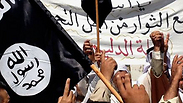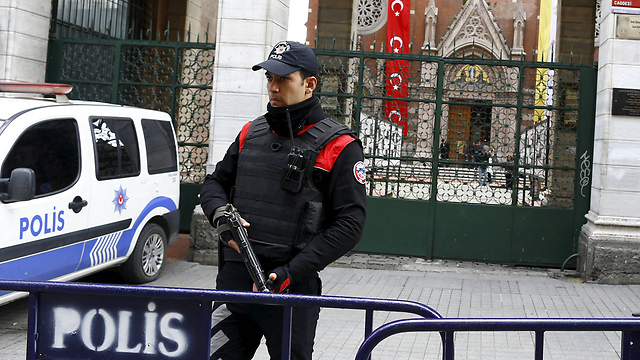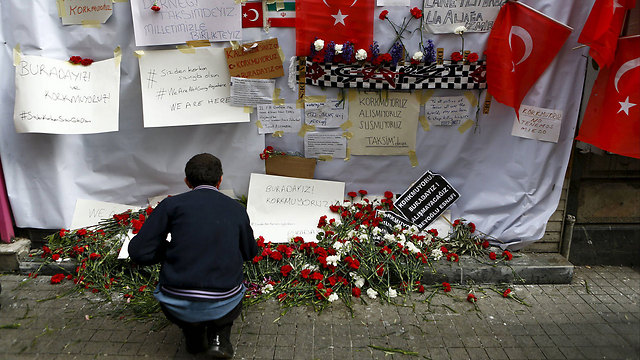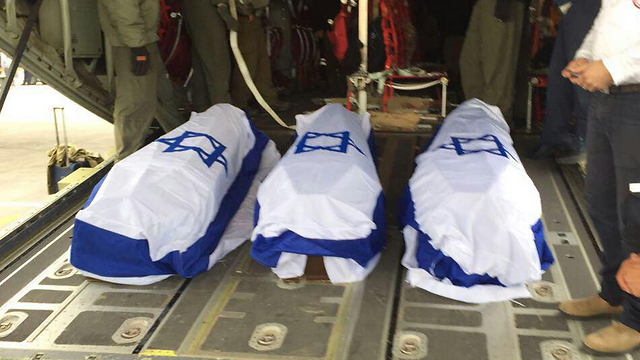
צילום: AP
ISIS threat growing as Turkey focuses on Kurds
Turkey is facing a latente insurgency by the Kurdish Workers Party (PKK) in its south east regions. However, this may be coming at the expense of its fight against ISIS.
ISTANBUL - As Turkey pushes on with its campaign against Kurdish militants linked to the Kurdistan Workers' Party (PKK), another deadly foe is gaining momentum - ISIS.
The jihadist network is considered responsible by Ankara for four out of six suicide attacks in the country since last summer, the most recent March 12 in Istanbul, where a suicide bombing killed four tourists on Istikal Street. It was the second time tourists were targeted in the city, coming just months after a January 12 attack that killed a dozen German tourists in one of Istanbul's most historic areas. Turkish authorities have blamed the group for two other attacks that killed a total of 136 people.
The acceleration of suicide bombings in Turkey comes after the country increased its involvement in the US led campaign against ISIS in Syria and amid renewed conflict between Turkish security forces and militants linked to the PKK, which Ankara and its allies label as a terrorist organization. Analysts question whether Turkey has concentrated its counterterrorism efforts too narrowly on the Kurdish threat.
"When most of the resources are focused on the rising threat of the PKK, that might provide some opening for ISIS to perpetrate its attacks," said Sinan Ulgen, chairman of Edam, a liberal-leaning think tank based in Istanbul.
Security was tight in Istanbul ahead of the March attack but mainly out of concern that violence could flare during Newroz, a spring festival observed by Kurds, which the authorities banned in most places. That fear was partly rooted in two deadly suicide bombings in Ankara this year, both claimed by a PKK-offshoot. The latest bomb attack against security forces by Kurdish rebels, on Thursday, killed 7 police officers and injured 27 others.
But ISIS, which has never claimed attacks on Turkish soil, seems to be fast becoming an equal if not greater threat --not only to Turkey's security and stability, but also its economy.
"ISIS is now having a major negative impact on the economy, in particularly damaging the tourism sector which constitutes for 12 percent of the economy," says Fadi Hakura, an expert on Turkey at Chatham House in London. Tourism Ministry figures show 1.24 million arrived in Turkey in February, a 10 percent decline compared to the same month in 2015.
Analysts view the ISIS attacks as an outcome of Turkey's policy in Syria, which has favored opposition factions striving to overthrow President Bashar al-Assad. According to them, from 2011 to 2014 Ankara largely turned a blind eye to the cross-border activities of rebels, allowing jihadists to flock to Syria and paving the way for IS to establish a so-called caliphate in Syria and clandestine cells in Turkey.
The government denies the accusation and has long called for closer cooperation with Western intelligence agencies to identify potential threats. The country has deported about 3,250 "foreign terrorist fighters" in the past five years, according to foreign ministry figures. As of March 2016, Turkey's no entry list included nearly 38,000 names, while risk analysis units have screened 9,500 people and denied entry to 2,000.
Last week, on the heels of the Brussels attacks which killed 35 people and injured 270 others, Erdogan revealed that one of the suspected bombers of Belgian nationality had been picked up by Turkey and deported to the Netherlands at the bomber's request. He faulted both European nations for failing to address the possible threat.
Turkey is seen as particularly vulnerable due to its proximity to IS-held territory and its participation in the U.S.-led coalition against the group, which responds to territorial setbacks in Syria and Iraq by staging sensational attacks against its enemies abroad.
"Turkey singlehandedly attempted to shape the outcome of the Syrian war and now Turkey is suffering due to the fallout of this ill-executed policy," says Soner Cagaptay, director of the Turkish research program at the D.C.-based Washington Institute for Near East Policy.
Domestically, Ankara has prioritized other battles, cracking down on opponents and dissidents of all stripes. Considerable resources have been devoted to settling scores with the Fethullah Gulen Hizmet movement, which is led by a U.S.-based cleric who fell out with the Turkish president. And there has been a purge in the ranks of law enforcement.
As for Turkey's war on terror, officials have repeatedly stressed that they considered the PKK threat to its national interests equal in magnitude to IS. That view is the result of a decades-old conflict with Kurdish insurgents that killed more than 40,000 and resumed last summer.
During the violent decades of the 80s and 90s, the primary security threat came from the PKK, a group the EU and the U.S. also list as a terrorist organization. Back then Turkey was surrounded by strong and stable neighbors. Today it faces multiple threats and spillover from the conflicts in neighboring Syria and Iraq.
Critics see this as a problem of Ankara's own making, arguing Turkey facilitated the rise of IS with its open door policy -- which led to the country sheltering 2. 7 million Syrian refugees -- while failing to do enough to keep potential terrorists from coming into the country. But under pressure from the West, Turkey has changed course and regularly deports suspected IS members or sympathizers from its airports
Since 2014, Turkey has stepped up controls along its border with Syria, with varying consistency and success, according to international observers. By the summer of 2015, Ankara was on board as an active partner in the U.S.-led coalition against IS, opening up its Incirlik air base for allied jets to carry out bombing runs in Syria.
While IS has responded with increased acts of aggression on Turkish soil, some analysts say it is no coincidence that it is picking "soft targets," including left-wing and Kurdish activists and foreigners - over symbols of the state or military installations. Most of of the attacks in Turkey have been carried out by Turkish nationals, according to the authorities.
"IS is very careful not to target areas where mass Sunni Turkish casualties will emerge as a consequence of the attack perpetrated," because it doesn't want to alienate potential supporters, said Ahmet Kasim Han, an international relations expert at Kadir Has University in Istanbul.
Han noted that Turkey has always been a target for IS, which featured the country in its Turkish-language magazine Konstantiniyye as well as its English-language glossy Dabiq as an area for expansion.
"Istanbul is seen as the second Rome and vanquishing Rome is an important step in this apocalyptic ideological path that IS embarked on," he said.













